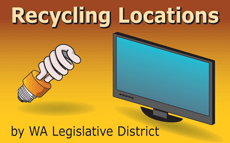Medicines Programs
Pharmaceuticals present both a public safety and environmental hazard if no secure disposal options exist. Therefore, a safe collection and disposal alternative is necessary. Such a collection infrastructure will only work if Product Stewardship is integral to the design whereby residential customers can “take-back” pharmaceuticals to local pharmacies and drug stores.
- Manufacturers should be responsible for the stewardship of their products on behalf of the communities they serve and the environment on which those communities depend for their health and well-being.
- A take-back system can be modeled after other take-back programs such as those for light bulbs, thermometers, batteries, computers and oil.
- Take-back conveniences bring the customer into the store. In waste oil collection programs carried out by auto parts stores, such service leads to increased sales. In the case of recent electronics take-back programs, in-store collection generated first time customers.
- A collection program is capable of collecting data that can be used to reduce waste thru educational efforts in both pharmaceutical use and prescription writing.
- Separate collection helps communicate the environmental impact of this waste stream to the responsible parties: consumers, retailers, and manufacturers.
- The program's cost may be easily absorbed by industry as a customer service, and not so easily by local governments, consumers, and/or rate payers.
- Governments do not know as much about the product or the characteristics of the waste as the makers of the product, thereby making government less capable to manage this waste.
There are many successful and cost-effective examples of manufacturer stewardship in pharmaceuticals, including British Columbia, Australia, Prince Edward Island, France, Italy, and several other European countries. Learn more about International Pharmaceutical take back programs.
